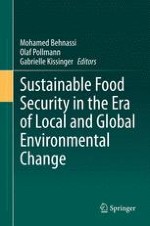2013 | OriginalPaper | Chapter
8. Climate Change and Food Insecurity: Institutional Barriers to Adaptation of Marginal Groups in the Far-Western Region of Nepal
Authors : Nirmal Kumar Bishokarma, Sagar Raj Sharma
Published in: Sustainable Food Security in the Era of Local and Global Environmental Change
Publisher: Springer Netherlands
Activate our intelligent search to find suitable subject content or patents.
Select sections of text to find matching patents with Artificial Intelligence. powered by
Select sections of text to find additional relevant content using AI-assisted search. powered by
